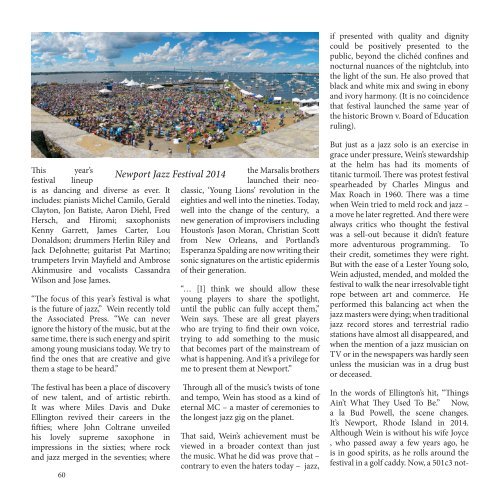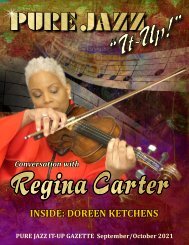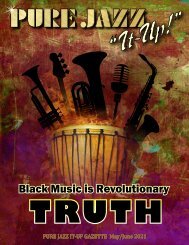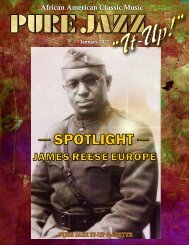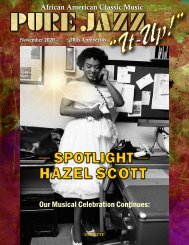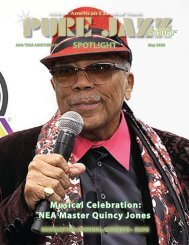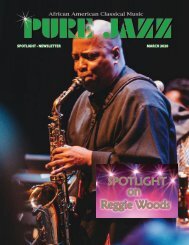CBJC Festival Magazine 2016
Central Brooklyn Jazz Consortium produces a Jazz Festival every year. 2016 brings our 17th Annual Festival. The Brooklyn grassRoots festival this year runs from April 15th until May 15. This years event was fantastic. View our magazine for a look inside.
Central Brooklyn Jazz Consortium produces a Jazz Festival every year. 2016 brings our 17th Annual Festival. The Brooklyn grassRoots festival this year runs from April 15th until May 15. This years event was fantastic. View our magazine for a look inside.
You also want an ePaper? Increase the reach of your titles
YUMPU automatically turns print PDFs into web optimized ePapers that Google loves.
if presented with quality and dignity<br />
could be positively presented to the<br />
public, beyond the clichéd confines and<br />
nocturnal nuances of the nightclub, into<br />
the light of the sun. He also proved that<br />
black and white mix and swing in ebony<br />
and ivory harmony. (It is no coincidence<br />
that festival launched the same year of<br />
the historic Brown v. Board of Education<br />
ruling).<br />
This year’s<br />
Newport Jazz <strong>Festival</strong> 2014<br />
festival lineup<br />
is as dancing and diverse as ever. It<br />
includes: pianists Michel Camilo, Gerald<br />
Clayton, Jon Batiste, Aaron Diehl, Fred<br />
Hersch, and Hiromi; saxophonists<br />
Kenny Garrett, James Carter, Lou<br />
Donaldson; drummers Herlin Riley and<br />
Jack DeJohnette; guitarist Pat Martino;<br />
trumpeters Irvin Mayfield and Ambrose<br />
Akinmusire and vocalists Cassandra<br />
Wilson and Jose James.<br />
“The focus of this year’s festival is what<br />
is the future of jazz,” Wein recently told<br />
the Associated Press. “We can never<br />
ignore the history of the music, but at the<br />
same time, there is such energy and spirit<br />
among young musicians today. We try to<br />
find the ones that are creative and give<br />
them a stage to be heard.”<br />
The festival has been a place of discovery<br />
of new talent, and of artistic rebirth.<br />
It was where Miles Davis and Duke<br />
Ellington revived their careers in the<br />
fifties; where John Coltrane unveiled<br />
his lovely supreme saxophone in<br />
impressions in the sixties; where rock<br />
and jazz merged in the seventies; where<br />
60<br />
the Marsalis brothers<br />
launched their neoclassic,<br />
‘Young Lions’ revolution in the<br />
eighties and well into the nineties. Today,<br />
well into the change of the century, a<br />
new generation of improvisers including<br />
Houston’s Jason Moran, Christian Scott<br />
from New Orleans, and Portland’s<br />
Esperanza Spalding are now writing their<br />
sonic signatures on the artistic epidermis<br />
of their generation.<br />
“… [I] think we should allow these<br />
young players to share the spotlight,<br />
until the public can fully accept them,”<br />
Wein says. These are all great players<br />
who are trying to find their own voice,<br />
trying to add something to the music<br />
that becomes part of the mainstream of<br />
what is happening. And it’s a privilege for<br />
me to present them at Newport.”<br />
Through all of the music’s twists of tone<br />
and tempo, Wein has stood as a kind of<br />
eternal MC – a master of ceremonies to<br />
the longest jazz gig on the planet.<br />
That said, Wein’s achievement must be<br />
viewed in a broader context than just<br />
the music. What he did was prove that –<br />
contrary to even the haters today – jazz,<br />
But just as a jazz solo is an exercise in<br />
grace under pressure, Wein’s stewardship<br />
at the helm has had its moments of<br />
titanic turmoil. There was protest festival<br />
spearheaded by Charles Mingus and<br />
Max Roach in 1960. There was a time<br />
when Wein tried to meld rock and jazz –<br />
a move he later regretted. And there were<br />
always critics who thought the festival<br />
was a sell-out because it didn’t feature<br />
more adventurous programming. To<br />
their credit, sometimes they were right.<br />
But with the ease of a Lester Young solo,<br />
Wein adjusted, mended, and molded the<br />
festival to walk the near irresolvable tight<br />
rope between art and commerce. He<br />
performed this balancing act when the<br />
jazz masters were dying; when traditional<br />
jazz record stores and terrestrial radio<br />
stations have almost all disappeared, and<br />
when the mention of a jazz musician on<br />
TV or in the newspapers was hardly seen<br />
unless the musician was in a drug bust<br />
or deceased.<br />
In the words of Ellington’s hit, “Things<br />
Ain’t What They Used To Be.” Now,<br />
a la Bud Powell, the scene changes.<br />
It’s Newport, Rhode Island in 2014.<br />
Although Wein is without his wife Joyce<br />
, who passed away a few years ago, he<br />
is in good spirits, as he rolls around the<br />
festival in a golf caddy. Now, a 501c3 not-


